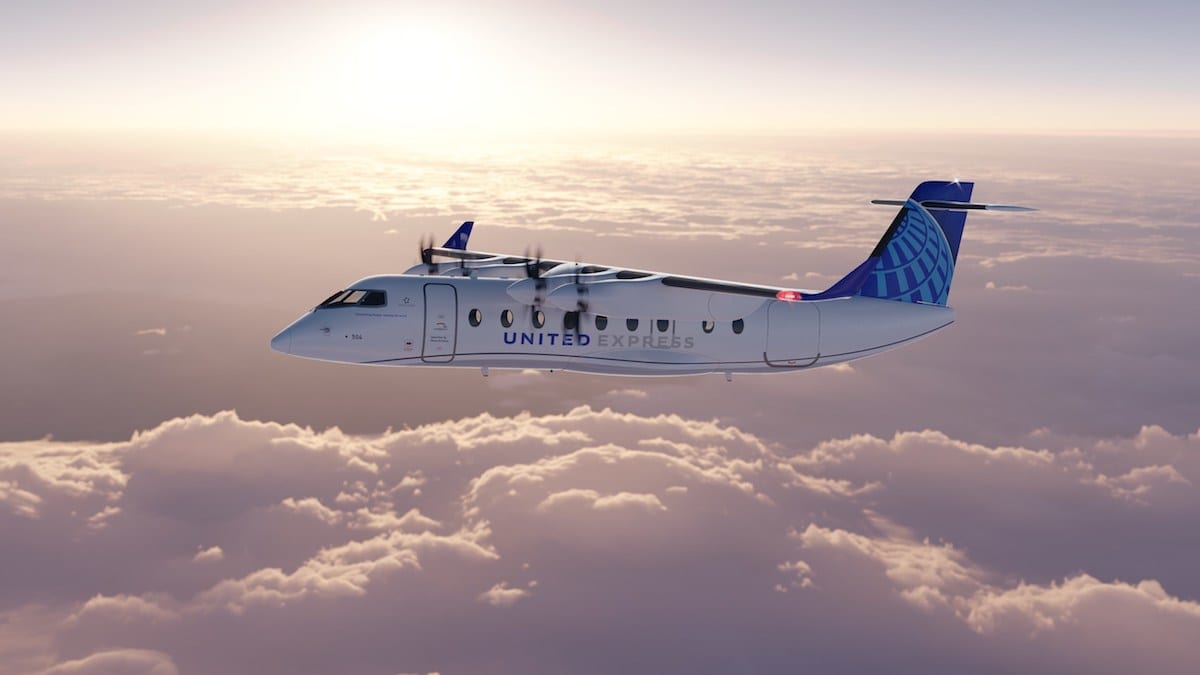
United Airlines’ latest electric aircraft investment came this week through a deal with Swedish startup Heart Aerospace, whose ES-19 all-electric regional jet is pictured here as a computer-generated mockup. (United Airlines)
Several major commercial airlines made headlines this week regarding new investments, partnerships, and ongoing studies of electric and hydrogen-powered aircraft. United Airlines and Icelandair signed separate agreements for next-generation aircraft and hydrogen, while Delta Air Lines CEO commented on the international carrier’s interest in the development of electric vertical takeoff and landing (eVTOL) aircraft.
The latest investment in next-generation aircraft from United Airlines came in the form of a July 13 announcement confirming a new investment in electric aircraft startup Heart Aerospace. United Airlines Ventures (UAV), along with Breakthrough Energy Ventures (BEV) and Mesa Airlines made a joint investment of $35 million toward the development of Heart Aerospace’s 19-seater ES-19 aircraft.
United has also “conditionally agreed” to purchase a 100 ES-19 aircraft, once Heart Aerospace meets a set of operational requirements established by the Chicago-based airline. Separately, United’s regional subsidiary Mesa Airlines has also agreed to add 100 ES-19 aircraft to its fleet under similar criteria established by United.
Gothenburg, Sweden-based Heart Aerospace is developing the ES-19 as all-electric fly-by-wire regional turboprop aircraft with a range of up to 217 nm. Heart expects the aircraft to be ready to achieve type certification from European and U.S. civil aviation authorities by the third quart of 2026.
Heart has been testing a ground-based prototype of the complete propulsion system over the last year and has received letters of intent to purchase the ES-19 from SAS, Wideroe, Air Greenland, and Finnair among others.
“Breakthrough Energy Ventures is the leading voice of investors who are supporting clean-energy technology creation. We share their view that we have to build companies who have real potential to change how industries operate and, in our case, that means investing in companies like Heart Aerospace who are developing a viable electric airliner,” Michael Leskinen, United’s Vice President Corp Development & Investor Relations, said in a statement. “We recognize that customers want even more ownership of their own carbon emissions footprint. We’re proud to partner with Mesa Air Group to bring electric aircraft to our customers earlier than any other US airliner.”
Icelandair has turned its clean-energy focus to hydrogen, signing an LOI with Universal Hydrogen, to “pursue the implementation of green hydrogen, a carbon-free aviation fuel, as a propellant for Icelandair’s domestic aircraft fleet,” according to a July 14 press release.
Universal Hydrogen, the California-based green startup that emerged from stealth last year, is developing an aftermarket hydrogen conversion kit for regional aircraft, as well as a fuel distribution system based on a unique modular hydrogen capsule technology. The startup sees its LOI as the first step in what could become an expanded partnership with Icelandair to include working with Icelandic hydrogen producers, transportation companies, and airports.
Icelandair operates a fleet of De Havilland Canada DHC-8-200 aircraft, that could become the first in its fleet to receive Universal Hydrogen’s conversion kit in the near future.
“Icelandair sets the standard high for responsible aviation, we are committed to reducing our carbon emissions and believe we are in a good position to become one of the world’s first airlines to fully decarbonize our domestic network,” Bogi Nils Bogason, President and CEO of Icelandair Group said in a statement. “Universal Hydrogen’s work across both fuel logistics and services as well as aircraft conversions would allow us to accelerate our pursuit of a fully decarbonized domestic fleet and we’re thrilled about the option to be an early adopter, that could bring hydrogen-powered Dash 8s to our skies in the next several years.”
While Delta Air Lines’ immediate fleet renewal strategy centers around the recent addition of 36 airliners to its fleet—including 29 used Boeing 737-900ERs and seven used Airbus A350-900s—an eventual investment or partnership around electric-powered aircraft is something they’re considering. During their July 14 second-quarter earnings call, CEO Ed Bastian was asked by an analyst to give his thoughts on eVTOL aircraft development based on some of the recent moves made by United Airlines.
“As you can appreciate every one of the proposed manufacturers has been after Delta. We’ve heard from many of them,” Bastian said referring to eVTOL developers. “We’re studying this space and we will continue to get good smartness space. I think it’s at a very, very early stage right now and I think a lot of the plans that we see are a bit premature, candidly. But it’s not anything that we are unaware of and I guarantee every one of those manufacturers would love to have Delta colors on their plane. So hard to predict timing but we’re in the marketplace having lots of conversations.”